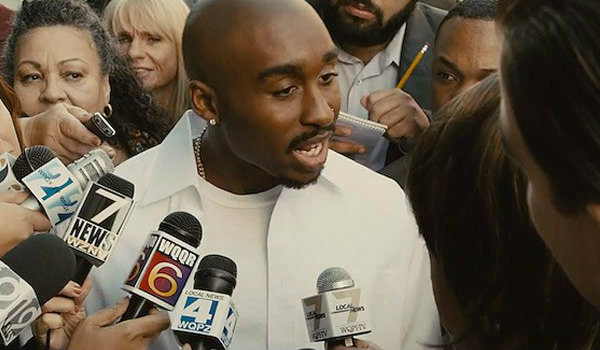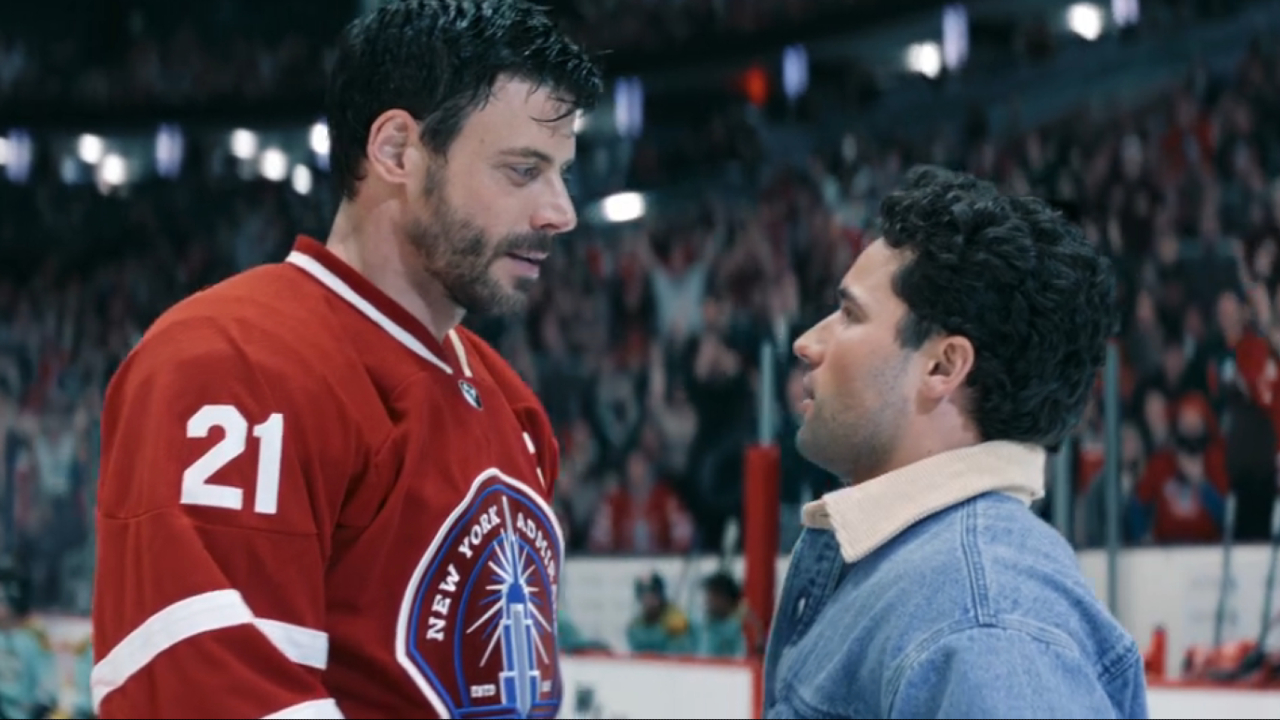The last few years have finally seen rap (particularly early 1990s rap) receive the artistic credit and admiration that it deserves from Hollywood. Movies like Notorious and Straight Outta Compton have endeavored to showcase the more nuanced and complicated sides of these musical iconoclasts, and we have seen some successful films pop up as a result. On that note, director Benny Boom's All Eyez on Me represents the latest addition to this growing subgenre of biopics. While the prospect of a film centering on someone as iconic and beloved as Tupac Shakur has already generated a wave of eagerness and fanfare, the film itself is a disjointed mess that cannot decide how it wants to frame its central figure.
The film begins in the middle of Tupac Shakur's (Demetrius Shipp Jr.) story, as we find him in jail after his 1993 sexual assault case. From there, the story moves (jarringly so, in fact) through the early years of his life -- chronicling his mother's (Danai Gurira) time as a member of the Black Panther Party, Tupac's tumultuous years in Baltimore, and his eventual decision to start rapping upon moving to California. Along the way we receive a "greatest hits" of Tupac's life -- all culminating in a fateful car ride on Las Vegas Boulevard on September 7, 1996. If you know the story, then you know where it's going. If you don't, then the movie will give you a basic enough arc to find out what happened in the end.
Upon watching All Eyez on Me, it becomes clear why a movie like Straight Outta Compton spent the bulk of its narrative exploring N.W.A's rise to fame from its chronological beginning. Human lives are dense, complex stories, and All Eyez on Me nearly collapses under its weight as it tries to fill audiences in on the events of Tupac's early life. It simply tries to do too much too quickly. The biopic often feels more like a reenactment than a full-blown film, with the thinly drawn characters' actions echoing the narration provided by Tupac himself. It's a whole lot of style over substance -- trying to be a documentary, a movie, and a music video all at once -- with little to say about what drove this legendary musician during his heyday.
By the way, when I say that the characters in this movie are thinly drawn, I mean razor thin. Aside from Tupac and his mother, there are virtually no other characters worth investing throughout the entirety of the narrative. Figures presented as "important" parts of the rapper's formative years and upbringing receive one or two scenes with him before one of the film's many fade outs jumps us ahead in time. There are numerous examples to pull from, but watch out for one particular appearance by a notable actor from The Walking Dead early in the film. The glorified cameo of this actor feels incredibly brief, jarring, and it perfectly exemplifies All Eyez on Me's inability to establish a properly fleshed out chorus of characters for exploring this story.
Those aforementioned time jumps are a big deal for this movie as well, because they epitomize its roughest and most pressing story problems. There's enough material in this film to create several different movies, but Benny Boom unwisely abridges all of these various stories into one less cohesive product that tries to tackle everything. We never stick around one era of Tupac's life for very long, and by the time the film fades back in, Tupac finds himself in an entirely new stage of his personal and professional existence with new sets of problems, friends, and enemies. While I certainly see the importance in taking a holistic view of the rapper's career, the film's unwillingness to firmly root itself in one particular aspect of the man makes it incredibly difficult for a Tupac newcomer to invest in him emotionally.
That said, things pick up towards the second half of the movie (if you can hold out that long) as it finds some footing in Tupac's years as an artist for Death Row Records. By and large, the characters become more defined as notable rap heavy-hitters like Dre, Snoop Dogg, and Suge Knight become more prominent in the story. In many ways, the final act of this film almost feels like an entirely different (and superior) story than what precedes it. If you can tough it out through the slog that is the first half of this film, all of the Death Row material is pretty good. The problem is that this increased clarity of focus isn't enough to make up for the weaknesses that plague the early portions of the film.
With all of that said, arguably the biggest issue with All Eyez on Me is the fact that it wants to have its cake and eat it too when it comes to the portrayal of its central protagonist. This Tupac is framed as a musical revolutionary, and a pillar of the black community, but the film takes diametrically opposed approaches to this concept from scene to scene. It attempts to make him represent the best and most profound elements of the rap subculture, while also shining a light on his many flaws, and those two ideas don't always jive. In trying to have it both ways (the visionary, as well as the man behind the visionary), the film focuses on the worst of both aspects, and Demetrius Shipp Jr. finds himself with little to properly chew on as a performer. In the end, it's a disservice to the story AND the source material.
Your Daily Blend of Entertainment News
Is there an audience for this film? Absolutely. As a deep dive into the life and legacy of one of rap's most influential figures, it will reward hip-hop enthusiasts and die-hard Tupac followers with some serious fan service. The problem is that it doesn't do much to explore the complicated nuances of this complicated man. All Eyez on Me is a loving tribute to Tupac Shakur, but its sloppy execution and scatterbrained story mean it will definitely not become the next Straight Outta Compton.
Originally from Connecticut, Conner grew up in San Diego and graduated from Chapman University in 2014. He now lives in Los Angeles working in and around the entertainment industry and can mostly be found binging horror movies and chugging coffee.


